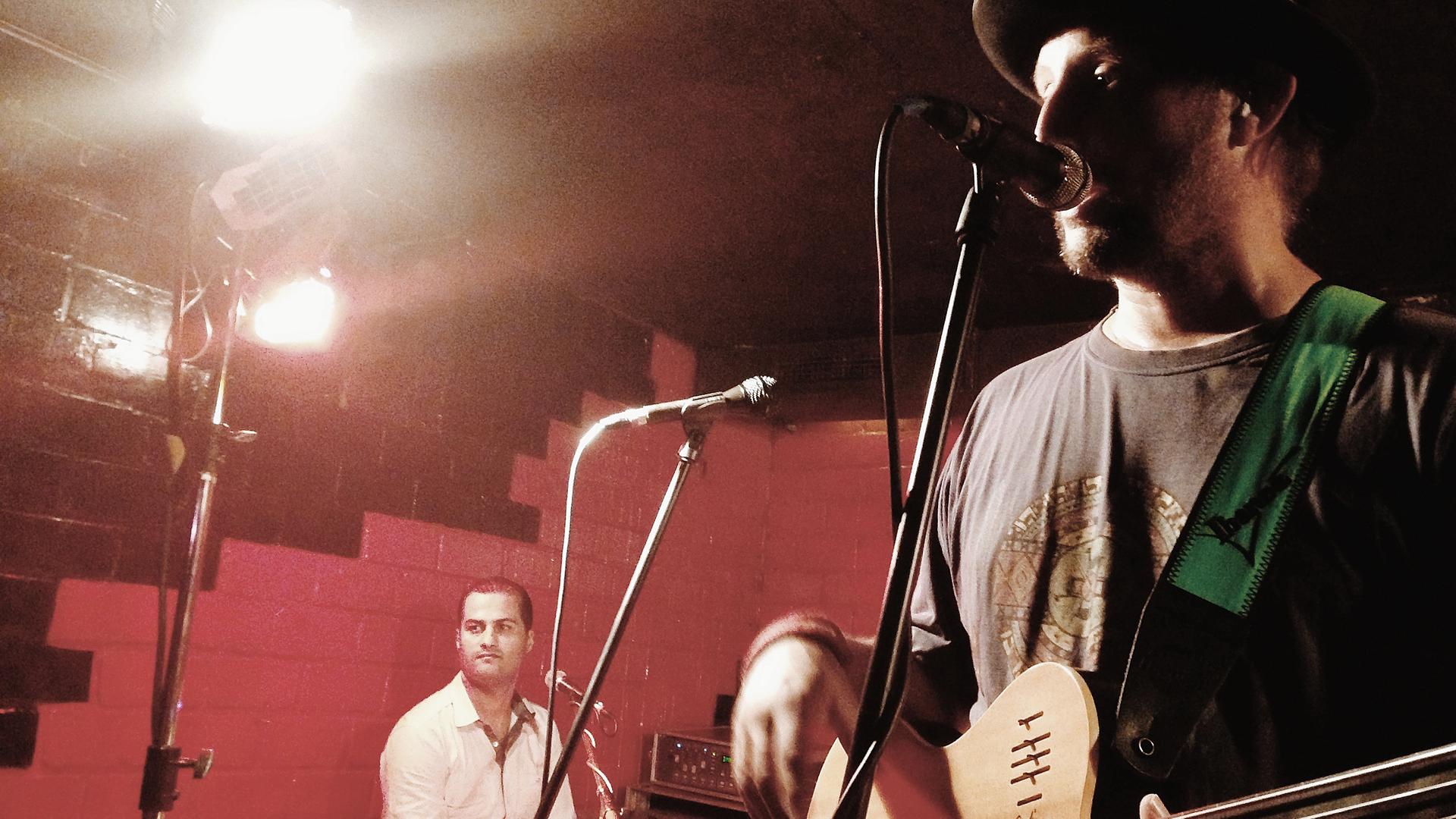World music all-stars head out on tour, with a reprieve from German detention centers
German musician Heinz Ratz leading his refugee band on a recent night in Giessen, Germany. The tour is designed to draw attention to the plight of tens of thousands of asylum seekers in Germany, many of whom wait decades in detention for their cases to be decided.
On a foggy night, a train rumbles past a dive bar in a sleepy German town. Inside the crowded bar, it’s another world.
A singer named Revelino, from Ivory Coast, belts out a reggae tune to a cheering dance floor.
“I came to Germany in 2010,” he said, before the show. “I was looking for a life with a bit more meaning.”
He said with the war in his homeland, you never knew if your life was going to continue or not.
“You could get killed in any moment by a stray bullet,” he said, “or get caught by rebels. Or soldiers. I came to Germany to save my skin.”
Revelino’s story is not unique. Every year, tens of thousands of migrants enter Europe, fleeing conflict and persecution. Many make their way to Germany. To deal with them, the German government has set up over a hundred refugee camps. If you apply for asylum, you must live in one.
Another man from Ivory Coast, a djembe drummer named Jacques, came to Germany in 2008. He said he was glad to be far from his home village where he’d been threatened with death for being gay. But he said five years of limbo in the German camp system had taken its toll.
“You can practice your music there, but you’re heart isn’t in it.”
“Without joy in your heart, you can’t do anything. The camp system is designed to kill your spirit,” he said.
The camps are filthy, he said, and overcrowded. You’re only allowed travel within a tiny radius of the center. You get food vouchers redeemable in only a few shops, instead of money. You can’t work or go to school.
The German government says it is doing the best it can, and points out that it takes in more refugees than most of its neighbors. It claims many migrants come because of Germany’s generous welfare system, not out of fear for their safety at home.
A 19-year-old Afghani rapper named Hosain says he doesn’t quite see the generosity in his camp. The worst thing about living there, he said, is the constant fear of being deported. He said that’s because you’re a virtual captive inside, making it easier for authorities to repatriate you. All they have to do is come to your room in the night. As they did recently, he said, snatching his best friend.
“It is really dangerous,” he said. “My best friend called me, in Afghanistan. He said, ‘I was in my room. Six am. Then tack-tack-tack at the door. It was the police. Let’s go, they said. Where? Why? To the airport.'”
Hosain said he never saw him again.
All these guys were professional or promising musicians back home. No one in Germany would likely ever know their names were it not for Heinz Ratz.
Ratz himself is a well-known German base player. A couple of years back, he biked around Germany, visiting 80 detention centers. He’d play shows nearby to draw attention to conditions. And he said the refugees would come out to listen. One day, he thought, there’s got to be good quality musicians among them. At first, he said, he was astonished.
“But then I thought, it’s not a wonder because musicians and artists are critical people,” he said. “And if they live in countries with dictators, it is very logical they have to flee.”
Ratz's recruits have permission for this tour. But when it’s over, most must return to their detention centers. Ratz said if he can make the refugee musicians known -even popular – treatment for all refugees might improve. He said it’s been a struggle to get anyone to listen. Even getting local newspaper coverage was tough.
“Now there’s a lot of discussion in newspapers,” he said. “But there’s also lots of people against refugees as well – right-wing neo-Nazis. So it’s becoming very difficult in Germany. A big fight is starting. But at least it is starting.”
He said German politicians have yet to respond. The tour is happening as the European Union wrestles with how to protect its borders and deal with more and more migrants, many of whom lose their lives en route. More than three hundred African asylum seekers drowned just last week off Italy’s coast.
Every day, reporters and producers at The World are hard at work bringing you human-centered news from across the globe. But we can’t do it without you. We need your support to ensure we can continue this work for another year.
Make a gift today, and you’ll help us unlock a matching gift of $67,000!
